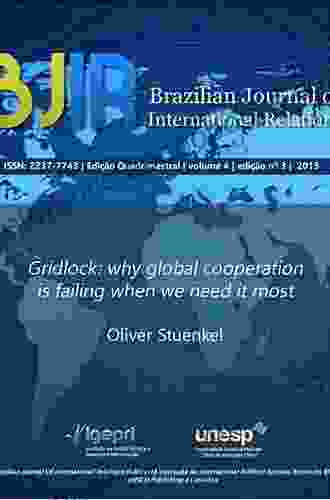Why Global Cooperation Is Failing When We Need It Most

4.4 out of 5
| Language | : | English |
| File size | : | 5036 KB |
| Text-to-Speech | : | Enabled |
| Screen Reader | : | Supported |
| Enhanced typesetting | : | Enabled |
| Word Wise | : | Enabled |
| Print length | : | 476 pages |
| Lending | : | Enabled |
In the face of pressing global challenges, such as climate change, poverty, and terrorism, effective global cooperation is essential for the well-being of humanity. However, recent events have exposed a glaring deficiency in international collaboration: Cooperation is failing when we need it most.
This article seeks to explore the reasons behind this failure, examining the interplay of political, economic, and social factors. By understanding the complexities underlying the decline in global cooperation, we can identify strategies to strengthen international collaboration and effectively address the challenges of the 21st century.
Political Factors
Political factors play a significant role in shaping the ability of nations to cooperate on a global scale. The rise of nationalism and populism has led to a shift towards isolationist policies in many countries. This inward-looking approach undermines multilateralism and makes it more difficult to reach consensus on global issues.
Moreover, power dynamics between nations can hinder cooperation. The dominance of a few powerful states can lead to a lack of inclusivity and a sense of powerlessness among smaller countries. This can result in a breakdown of trust and a reluctance to engage in cooperative endeavors.
Geopolitical rivalries and conflicts further complicate the prospects for global cooperation. When nations are engaged in conflicts or have conflicting strategic interests, it becomes increasingly challenging to prioritize the common good over national interests.
Economic Factors
Economic factors also influence the willingness of nations to cooperate internationally. Economic disparities between countries can create tensions and lead to protectionist policies that prioritize domestic interests at the expense of global welfare.
The rise of global inequality has exacerbated these tensions. As the gap between the rich and the poor widens, it becomes more difficult to build consensus on policies that promote both economic growth and social justice.
Furthermore, economic competition can lead to a reluctance to share resources and expertise with other nations. This can hinder the development of innovative solutions to global challenges that require collective action.
Social Factors
Social factors also play a role in shaping the attitudes towards global cooperation. Cultural differences, biases, and stereotypes can create barriers to understanding and empathy between people from different parts of the world.
Lack of education and access to information can perpetuate these biases and hinder the development of a global consciousness. This can make it difficult for people to recognize the interconnectedness of global challenges and the need for collective action.
Moreover, fear and mistrust can undermine cooperation. In a world marked by conflict and instability, many people feel insecure and prioritize their own safety and well-being over the needs of others. This can lead to a breakdown of social solidarity and a reluctance to engage in cooperative ventures.
Consequences of Failure
The failure of global cooperation has severe consequences for the world. When nations fail to collaborate effectively, it becomes more difficult to address global challenges.
Climate change, for example, is a complex issue that requires coordinated action from all nations. However, the lack of global cooperation has led to slow progress in reducing greenhouse gas emissions and adapting to the effects of climate change.
Similarly, the rise of global terrorism and instability poses a threat to peace and security worldwide. Yet, the failure of nations to cooperate in combating terrorism has allowed extremist groups to flourish and spread their influence.
The failure of global cooperation also exacerbates economic inequality and social injustice. When nations prioritize their own interests, they neglect the needs of developing countries and marginalized populations. This can lead to increased poverty, conflict, and instability, which further undermine global cooperation.
Recommendations for Strengthening Cooperation
Despite the challenges, strengthening global cooperation is essential for the well-being of humanity. By addressing the political, economic, and social factors that hinder cooperation, we can create a more conducive environment for international collaboration.
To strengthen political cooperation, it is important to promote inclusivity and dialogue between nations, regardless of their size or power. This can be achieved through multilateral institutions like the United Nations, which provide a platform for all nations to voice their concerns and work towards common goals.
Additionally, it is essential to address the root causes of conflicts and geopolitical rivalries. This requires diplomacy, negotiation, and a willingness to compromise in the pursuit of peace and stability.
To strengthen economic cooperation, it is important to address global inequality and promote inclusive economic growth. This can be achieved through fairer trade policies, increased development assistance, and investment in infrastructure and education in developing countries.
It is also essential to foster cooperation in science, technology, and innovation. By sharing knowledge and resources, nations can accelerate progress in addressing global challenges and improving the lives of people around the world.
To strengthen social cooperation, it is important to promote education and intercultural exchange. This can help break down barriers of prejudice and foster understanding and empathy between people from different backgrounds.
Furthermore, it is essential to address the root causes of fear and mistrust. By promoting peace, security, and human rights, we can create a more stable and just world that encourages cooperation and collaboration.
In a world facing unprecedented challenges, global cooperation is more important than ever. However, cooperation between nations is failing when we need it most. The political, economic, and social factors that hinder cooperation must be addressed to create a more conducive environment for international collaboration.
By strengthening political cooperation, promoting inclusivity, and addressing
4.4 out of 5
| Language | : | English |
| File size | : | 5036 KB |
| Text-to-Speech | : | Enabled |
| Screen Reader | : | Supported |
| Enhanced typesetting | : | Enabled |
| Word Wise | : | Enabled |
| Print length | : | 476 pages |
| Lending | : | Enabled |
Do you want to contribute by writing guest posts on this blog?
Please contact us and send us a resume of previous articles that you have written.
 Book
Book Novel
Novel Page
Page Chapter
Chapter Text
Text Story
Story Genre
Genre Reader
Reader Library
Library Paperback
Paperback E-book
E-book Magazine
Magazine Newspaper
Newspaper Paragraph
Paragraph Sentence
Sentence Bookmark
Bookmark Shelf
Shelf Glossary
Glossary Bibliography
Bibliography Foreword
Foreword Preface
Preface Synopsis
Synopsis Annotation
Annotation Footnote
Footnote Manuscript
Manuscript Scroll
Scroll Codex
Codex Tome
Tome Bestseller
Bestseller Classics
Classics Library card
Library card Narrative
Narrative Biography
Biography Autobiography
Autobiography Memoir
Memoir Reference
Reference Encyclopedia
Encyclopedia A M Myers
A M Myers Deante Young
Deante Young Eli Berman
Eli Berman Hillegonda C Rietveld
Hillegonda C Rietveld P R Williamson
P R Williamson Iain S Thomas
Iain S Thomas Andres Angulo Minota
Andres Angulo Minota Stephany Travers
Stephany Travers Howard Frank Mosher
Howard Frank Mosher Adam Vines
Adam Vines Amanda Haas
Amanda Haas Aida Mollenkamp
Aida Mollenkamp John P Dourley
John P Dourley Arthur Teles Leppaus
Arthur Teles Leppaus Julie Coe
Julie Coe Adam Ockelford
Adam Ockelford Aaron Shurin
Aaron Shurin Maia Kobabe
Maia Kobabe Maz Johnrose
Maz Johnrose Matt Morton
Matt Morton
Light bulbAdvertise smarter! Our strategic ad space ensures maximum exposure. Reserve your spot today!

 Daniel KnightExperience the Magic of Broadway with Rodgers Hammerstein Songbook Beginning...
Daniel KnightExperience the Magic of Broadway with Rodgers Hammerstein Songbook Beginning...
 Gordon CoxPublic Debt Inequality and the Intellectual Origins of the French Revolution:...
Gordon CoxPublic Debt Inequality and the Intellectual Origins of the French Revolution:... Trevor BellFollow ·2.4k
Trevor BellFollow ·2.4k Cormac McCarthyFollow ·6.2k
Cormac McCarthyFollow ·6.2k Lord ByronFollow ·3.8k
Lord ByronFollow ·3.8k Duncan CoxFollow ·18.3k
Duncan CoxFollow ·18.3k Jim CoxFollow ·5.2k
Jim CoxFollow ·5.2k Isaac AsimovFollow ·17.2k
Isaac AsimovFollow ·17.2k John Dos PassosFollow ·4.1k
John Dos PassosFollow ·4.1k Gustavo CoxFollow ·15.8k
Gustavo CoxFollow ·15.8k

 Justin Bell
Justin BellUnlock National Biology Success: The Ultimate Guide to...
Mastering the Fundamentals: A Comprehensive...
 Luke Blair
Luke BlairAC/DC: The Early Years with Bon Scott – A Thunderstruck...
In the annals of rock and roll history, few...

 Darren Nelson
Darren NelsonSpinal Cord Medicine Second Edition: The Comprehensive...
The second edition of Spinal Cord Medicine...

 Cole Powell
Cole PowellArabian Horse Training: Unlock the Secrets for a...
Indulge in the captivating world of Arabian...

 Oscar Wilde
Oscar WildeRevise Curriculum For Excellence SQA Exams: The Ultimate...
The Scottish...

 David Peterson
David PetersonEndoscopic Ear Surgery: A Comprehensive Guide for...
Endoscopic Ear...
4.4 out of 5
| Language | : | English |
| File size | : | 5036 KB |
| Text-to-Speech | : | Enabled |
| Screen Reader | : | Supported |
| Enhanced typesetting | : | Enabled |
| Word Wise | : | Enabled |
| Print length | : | 476 pages |
| Lending | : | Enabled |








